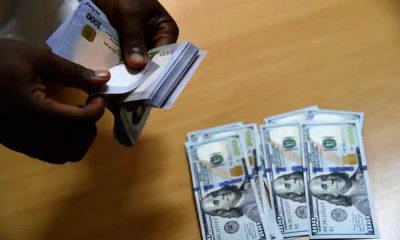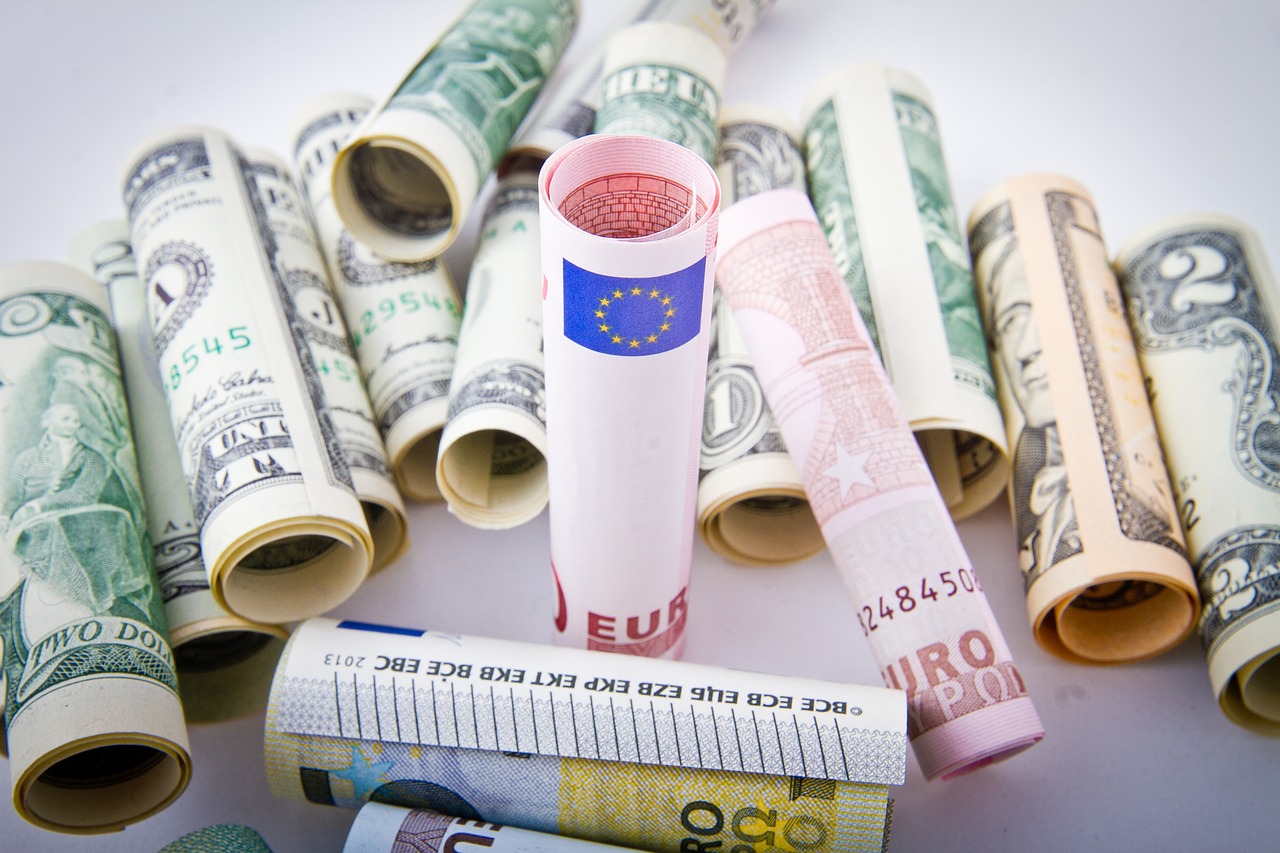Economy
CBN Injects $9b into Forex Market in 7 Months—Report

By Modupe Gbadeyanka
Not less than $9 billion has been released to the foreign exchange (forex) market in the last seven months by the Central Bank of Nigeria (CBN) in order to keep the Naira at the current rate it trades at the market, Daily Trust is reporting.
The apex bank started its regular intervention on February 21, 2017 and the forex sales were intended to cover for personal and business travels, medical needs, and school fees, futures market and other approved transactions.
Since then till August 31, Daily Trust said about $9 billion has so far been released based on all the official data of forex sales released to the public by the CBN within the period.
When this intervention began, the local currency was being traded at over N520 per Dollar, but at the moment, it has been hovering around N360 to N370 per Dollar.
On February 21, when the CBN interventions began, the CBN offered for sale $370,810,810.79 to 23 banks to meet the “visible and invincible” requests of customers. At the end of February, the CBN had sold out some $550,900,000 in interventions.
Over the next six months FX sales by the CBN were as follows: March; $1,022,000,000; April, $1,321,860,000; May, N1, 422,800,000; June, $1,651,500,000; July, $1,638,800,000 and August, $1,301,000,000.
Thus in seven months, CBN had intervened in the forex market to the tune of $8,908,860,000. Within the period, the Naira appreciated from N520/$1 to N365 to the Dollar at the parallel market.
The forex intervention also doused tensions in the forex market and forced rent seekers out of the market.
But experts wonder whether the cost to the country of nearly $9 billion, against the gains recorded are worth it.
They argue that it is worrying the CBN is funding the market more than the private sector investors,. The private sector ideally should fund the FX market more than the Central Bank, they argue.
Prior to Nigeria’s forex crisis, the market was funded by both the private sector and the CBN.
At the beginning, Nigeria had about $2.7 billion foreign investment from the JP Morgan and $500 million from Barclays but all of these monies were taken out when the CBN tightened controls on the Naira.
Nigeria’s external reserve dropped to $28 billion and the CBN couldn’t meet a lot of forex demands such as the repatriation of funds by the airlines.
To conserve the foreign reserve, the CBN had even stopped funding BDCs and invisibles in addition to restriction of forex on 41 items.
Mr Moses Azege, a Lagos based financial expert said the CBN intervention was unusual, the market didn’t expect it but it worked in stabilising the market.
“Before the intervention, the market was volatile, a lot of profiteering and the banks also got into the business of round tripping,” he said.
He however noted that, the intervention averted the forex apprehension, and ended business for rent seekers and speculators.
On whether the CBN move was sustainable he said, so far, the CBN has shown it can sustain it with the level of interventions.
Mr Rislanudeen Mohammed, the former Acting Managing Director, Unity Bank Plc, said the “Central Bank intervention over the last several months has impacted positively in stabilizing the foreign exchange market and reducing the gap between parallel and black market rates from about N520 to a dollar to the present rate of about N365.”
The “Forex liquidity has also helped in reducing the impact of cost push and imported inflation as evidenced by consistent reduction in core inflation data to present level of 16.05 percent as released by National bureau of statistics. Introduction of NAFEX has also improved transparency in the market hence incentivizing foreign portfolio as well as direct investments” he noted.
However, he explained that “sustaining this intervention is both unrealistic and impossible in the long term. Note that positive oil price, improved oil output as a result of reduced sabotage by Niger delta avengers as well as output quota waiver by OPEC combined to support improved forex income earnings and consolidating improved foreign reserves despite the intervention and attendant depletion of the reserve. Those three factors may not last ad infinitum. To consolidate on success made so far, we need to expeditiously walk the talk in export income diversification.”
On whether the naira can exchange for N200/$1 in the near future he said, it is basically a function of demand and supply. But even the IMF is looking at N365 as the official rate. But it can be determined by market forces” he said.
Nigeria’s foreign exchange reserves stood at a two and a half-year high of $31.81 billion as of August 29, the CBN data showed yesterday.
The latest figure was at a level it last reached in January 2015. Experts have attributed the appreciation of the local currency to the growth in the external reserve and ability of the apex bank to provide enough forex for the market.
Economy
Nigeria to Export New Crude Grade Cawthorne in March

By Adedapo Adesanya
The Nigerian National Petroleum Company (NNPC) Limited is set to commence export of a new light, sweet crude grade known as Cawthorne from March 2026.
According to a report by Reuters, an NNPC spokesperson confirmed the development, describing it as part of efforts to increase output and consolidate Nigeria’s recent recovery in crude oil production.
The move aligns with Nigeria’s broader strategy to boost production after years of constraints caused by pipeline vandalism, crude theft, and unrest in oil-producing regions.
This follows the launch of two other new grades, Obodo in 2025 and Utapate in 2024, Nigeria, whic,h as Africa’s top oil exporter, seeks to strengthen its standing within the Organisation of the Petroleum Exporting Countries and its allies (OPEC+)
Cawthorne crude is scheduled for export in the third week of March and has an API gravity of 36.4, making it similar in quality to Nigeria’s Bonny Light, which is prized for high petrol and diesel yields.
According to Reuters, citing a trading source, the state oil national company issued a tender last week for cargo loading between March 24 and 25.
Analysts at Kpler noted that the new grade is expected to be exported via the Floating Storage and Offloading (FSO) vessel Cawthorne, which has a storage capacity of about 2.2 million barrels. The vessel is designed to enhance transportation and production from Oil Mining Lease (OML) 18 and nearby assets in the Eastern Niger Delta.
Kpler estimates that, based on storage capacity, Cawthorne could increase Nigeria’s crude and condensate output from roughly 1.65 million barrels per day to around 1.7 million barrels per day for the remainder of the year.
Nigeria’s crude oil production recently dropped from the OPEC+ quota of 1.5 million barrels per day, with output at 1.48 million barrels per day recorded in January, according to OPEC data.
Beyond increasing Nigeria’s crude offerings to the international market, the introduction of Cawthorne could also attract buyers seeking specific light, sweet crude qualities, buoy foreign exchange earnings, which would help strengthen government revenue and ease borrowing needs.
New crude grades are typically differentiated by sulfur content, API gravity, and production source, enabling producers to target specific refinery configurations and market segments.
In November 2024, NNPC officially launched the Utapate crude oil blend in the international market, describing it as a milestone for Nigeria’s export profile.
Earlier in July 2024, NNPC and its partner, Sterling Oil Exploration & Energy Production Company (SEEPCO), lifted the first 950,000-barrel cargo of Utapate crude, which was shipped to Spain.
Economy
Moniepoint Research Shows Diminishing Role of Cash in Nightlife Payments

By Modupe Gbadeyanka
A new report released by Africa’s leading all-in-one financial ecosystem, Moniepoint Incorporated, has revealed that the use of cash for financial transactions is gradually dying due to security concerns.
The study, which looked into transaction data of over 27,000 clubs, bars, and lounges, showed that bank transfers dominated, followed closely by card payments, with cash actively discouraged. It was observed that transfers outpace card payments by nearly 2 million transactions during peak nighttime hours across its network.
In the research titled The Business of Community Nightlife in Nigeria, findings provided a rare, data-driven look into the country’s informal night economy.
While high-end Detty December venues grabbed headlines with daily revenues of N360 million and table prices reaching N1.2 million, Moniepoint’s study shifted the spotlight to the “community nightlife” where roadside bars, suya spots, and neighbourhood joints form the bedrock of social life for millions of Nigerians.
One of the study’s most operationally significant findings concerns the timing of spending. Nightlife in Nigeria runs late, but economically, the night is decided early.
Transaction volumes begin climbing sharply from 8 pm, peak before midnight, and then decline steadily even as venues remain full. By the time the night is at its longest, purchasing activity has already wound down.
However, for bar operators, this has clear practical implications – the most critical hours for staffing, stocking, vendor payment and cash flow management are the earliest hours of the day between midnight and 6 am.
The report further underscores the sector’s role in employment, noting that local bars typically expand their workforce by 30-50 per cent on peak nights. Conservative estimates suggest that at least 54,000 people are engaged in nightlife labour every night across Nigeria.
It was also observed that the most common transaction narrations from the data sourced – “food”, “pay”, “sent”, “pos”, “cash” – reflect the full breadth of nightlife spending: street food, club entry, lounge tabs, transport, and afterparties. Digital payments have gained huge traction in Nigeria’s social space.
While alcohol remains a key revenue driver, the data shows that food is the quiet stabiliser of Nigeria’s night economy, particularly in local and informal settings. In several neighbourhood venues, bottled water and meals outsell beer and spirits, especially early in the evening.
Lagos leads in sheer concentration of nightlife establishments, with 4,856 bars, clubs, and lounges on the Moniepoint network. FCT follows with 2,515, then Rivers (2,362), Delta (1,930), and Edo (1,574).
Katsina leads the country in nighttime food truck payment value, with vendors pulling in over N130 million in the last 12 months. Kwara State leads in transaction count. Nigeria’s nightlife economy is distributed, not overly elitist.
On the lending side, the report noted that a significant share of loan requests from bar and lounge operators is directed toward renovations, furniture, lighting, and sound systems, showing that investments are intended to attract and retain customers in a competitive sector where ambience plays a decisive role.
Commenting on the report, the chief executive of Moniepoint, Mr Tosin Eniolorunda, said, “Nigeria’s local bars and night-time operators are not peripheral to the economy; they are a critical part of its architecture. We see a substantial and sustained economic sector that employs hundreds of thousands of Nigerians every night and deserves the same attention we give to agriculture, healthcare, and retail.
“Our goal is to make sure every one of those businesses has the tools to grow. From giving credit to finance renovations and sound systems to providing same-day settlement that allows vendors to restock and with tools like Moniebook that power inventory management and reconciliation, Moniepoint is ensuring that this vital artery of the nation’s economy remains viable and empowering.”
Economy
CBN Reduces Interest Rate by 50 Basis Points to 26.50%

By Adedapo Adesanya
The Central Bank of Nigeria (CBN) has cut the interest rate by 50 basis points to 26.50 per cent from 27 per cent.
Nigeria’s apex bank announced this during its two-day 304th Monetary Policy Committee (MPC) meeting, which concluded on Tuesday in Abuja.
This comes after the country’s interest rate cooled in January to 15.10 per cent from 15.15 per cent, according to the National Bureau of Statistics (NBS), strengthening the case for a reduction.
The CBN Governor, Mr Yemi Cardoso, said all members of the MPC unanimously agreed upon the decision.
“The committee decided to reduce the monetary policy rate by 50 basis points to 26.50 per cent,” he said.
Mr Cardoso stated that the liquidity ratio was maintained at 30 per cent, and the standing facilities corridor was adjusted to +50 to -450 basis points around the monetary policy rate.
He said the committee retained the Cash Reserve Ratio (CRR) at 45 per cent for commercial banks and 16 per cent for merchant banks, while the 75 per cent CRR on non-TSA public sector deposits was equally maintained.
The CBN uses the MPR, which works as the benchmark interest rate, to manage inflation, macroeconomic stability, and liquidity.
Last November, the MPC retained the Monetary Policy Rate (MPR) at 27.00 per cent. The last time the apex bank cut interest rates was in September last year, to 27 per cent from 27.50 per cent after a series of easing in inflation.
Market analysts had argued for higher interest cuts due to results seen in the CBN’s inflation targeting framework. Meanwhile, some say the 50 basis points reduction will offer a temporary reprieve as inflation heads for a single-digit target in the coming months.
-

 Feature/OPED6 years ago
Feature/OPED6 years agoDavos was Different this year
-
Travel/Tourism10 years ago
Lagos Seals Western Lodge Hotel In Ikorodu
-

 Showbiz3 years ago
Showbiz3 years agoEstranged Lover Releases Videos of Empress Njamah Bathing
-

 Banking8 years ago
Banking8 years agoSort Codes of GTBank Branches in Nigeria
-

 Economy3 years ago
Economy3 years agoSubsidy Removal: CNG at N130 Per Litre Cheaper Than Petrol—IPMAN
-

 Banking3 years ago
Banking3 years agoSort Codes of UBA Branches in Nigeria
-

 Banking3 years ago
Banking3 years agoFirst Bank Announces Planned Downtime
-

 Sports3 years ago
Sports3 years agoHighest Paid Nigerian Footballer – How Much Do Nigerian Footballers Earn

















